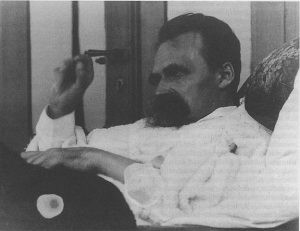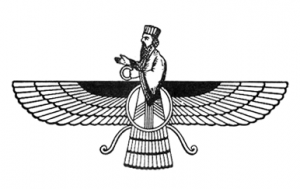Chapter Five – Death of the Western God
Notes on Friedrich Nietzsche
Friedrich Nietzsche (Prussian Philosopher 1844-1900)

-
Encouraging Words from an Influential Philosopher:
- Michel Foucault said of Nietzsche: “The only valid tribute to thought such as Nietzsche’s is precisely to use it, to deform it, to make it groan and protest.”
Highlights of Nietzsche
- Greek and Roman philologist
- Department Chair at age of 24 of Classical Philology at the University of Basel
- Anti-feminist
- Mental Collapse at age 48
- Died at age 56, probably of brain cancer
- Elizabeth Förster-Nietzsche re-works his writings and unpublished notes to make them appear as antisemitic and nationalist
Early Life
- Born in Prussia in 1844. Friedrich’s father is a Lutheran Pastor and former teacher, while his mother is a homemaker. His father dies when he is 5 years old.
- Attended prestigious schools, was interested in religious and classical studies
- Studied theology and philosophy at the University of Bonn. Denounces his faith and abandons
theological studies after one semester - He focuses on his study of philosophy after abandoning theology
Theoretical Influences
- Greek philosophers
- Immanuel Kant
- John Stuart Mill
- Arthur Schopenhauer
- Baruch Spinoza
- Richard Wagner (later distances himself due to Wagner’s Christianity, “German Culture,” and antisemitism)

Faravahar by Furfur Later Life
- With failing health, he continues to work independently, funded by his pension and friends
- Some claim syphilis was cause of ill-health but modern scholarship suggests brain cancer and other illnesses
- This so called “Nazi” requested his citizenship (Prussian) be removed. He remained stateless until his death and claimed he was of Polish noble birth (“Slav”)
The Tightrope Walker
Critique of Modernity
- Inexorable spread of decadence
- Flaccid reign of the last man (opposite of the Overman)
- Twilight of the idols
- Modernity has made man unmotivated and uncreative. The will to nothing looms in the horizon (as opposed to the will to power)
Overman (Uberman)
- Willing to risk it all to enhance humanity
- The “last man” desires comfort, incapable of creating anything
- Overman creates their own set of values with happiness and pleasure now, with a purpose for humanity
Against Herd Values of Christianity
- Will to power to creatively influence the thought of others over generations
- Their existence and power live on after their death
Main Concepts
- God is Dead
- Perspectivism
- Will to Power
- Slave-Master
- Body
Nietzsche Video Lecture
Media Attributions
- Nietzsche Olde 08 © Hans Olde is licensed under a Public Domain license
- Faravahar © Furfur is licensed under a Public Domain license

